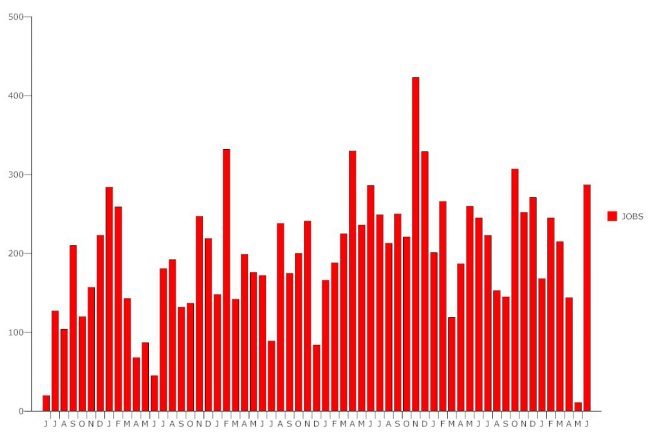
The national economy in June added 287,000 jobs, its best performance in eight months and a sharp reversal from May’s slumber, when just 11,000 jobs were created–the worst monthly performance since the end of the Great Recession seven years ago. June’s performance suggests that the May figures were either a fluke or influenced by a strike at Verizon of 35,000 workers.
Underlying factors in the economy also point to various strengths, including low claims for unemployment benefits and a record number of unfilled jobs (5.8 million). It is the last unemployment report before the National Republican Convention on July 18-21, where the more positive jobs figures are likely to be more muted than if May’s poorer numbers had continued. Conversely, the strong employment numbers have helped edge President Obama’s approval rating above 50 percent consistently for the past few months, so far aiding Democratic hopes in November. The Democratic National Convention in Philadelphia is scheduled for July 25-28, when the same numbers are likely to be played up.
The unemployment rate, however, rose to 4.9 percent, from 4.7 percent, as more people returned to the workforce and the number of unemployed people increased by 347,000 to 7.8 million. But the government’s alternative measure of unemployment and underemployment shows a decline to 9.6 percent, from 9.7 percent. That rate is a more accurate measure of the labor situation, as it includes all discouraged workers (people who have dropped out of the labor force) and workers employed part-time because they could not find full-time work, or because their hours were cut back. Those part-timers’ numbers decreased significantly, by 587,000, to 5.8 million in June, but that only offset a significant increase in June. There were also 502,000 discouraged workers.
The labor force participation rate, at 62.7 percent, and the employment-population ratio, at 59.6 percent, changed little in June, and both remain well below their pre-recession levels, though the lower numbers reflect the large number of older baby-boomers who are leaving the workforce every month.
In June, average hourly earnings went up 2 cents, to $25.61, following a 6-cent increase in May. Over the past year, wages have increased 2.6 percent, only marginally better than inflation.
Among the job report’s highlights: Leisure and hospitality added 59,000 jobs in June, following little employment change in May. Restaurants and bars added 22,000 jobs. Health care and social assistance added 58,000 jobs, financial activities showed an increase of 16,000 jobs, information technologies and sectors added 44,000 jobs, professional and business services added 38,000, retail added 30,000. Mining lost 6,000 jobs, for a total loss of 211,000 since September 2014. Employment in other major industries, including construction, manufacturing, wholesale trade, transportation and warehousing, and government, showed little or no change in June.
“We are reminded of the importance of focusing on long-term trends rather than one month’s results,” Labor Secretary Thomas Perez said in a statement this morning. “All told, American businesses have added 14.8 million jobs since February 2010, a remarkable recovery from the greatest economic crisis of our lifetimes. In June, the unemployment rate remained below 5 percent – down from 10 percent at the height of the recession. Weekly initial claims for unemployment insurance have been below 300,000 for 70 weeks, the longest streak since 1973.”
Consumer confidence is back to pre-recession levels, with 1.4 job seekers for every job opening, compared to seven job seekers for every job during the recession.
“Though today’s report confirms that our economy is resilient and strong, we still have more work to do to ensure that the prosperity we have created is broadly shared,” Perez said. “We can start with two measures that Congress has so far refused to take up: raising the federal minimum wage and guaranteeing access to paid sick and parental leave. I am heartened by the many states and localities that have taken these matters into their own hands, as well as those that will put those questions directly before the people via ballot referenda in November. But you shouldn’t have to win the ‘geographic lottery’ to get a fair wage or the tools you need to succeed at work and at home. There is no substitute for congressional action.”





























Knightwatch says
Excellent news. More people are coming into the workforce, wages are going up, the market is way up and home values are rising fast. All good economic news… except on Fox Business News. There, in their bizarro world, the U.S. is falling apart at the seams and will soon experience another great depression. I agree. When I absolutely want to feel depressed, I watch Fox. Works every time.